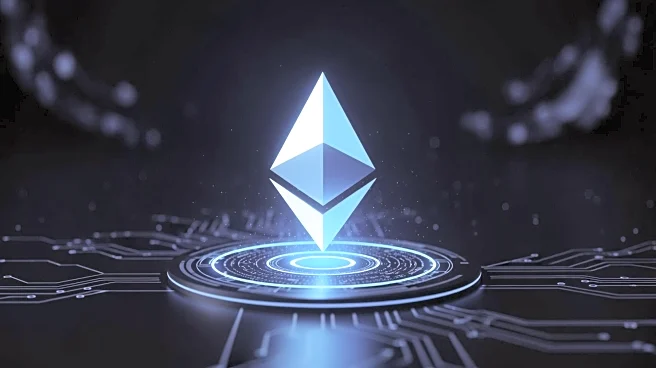What's Happening?
Ethereum has experienced a significant surge in value, outperforming Bitcoin with a 120% increase over the past six months, reaching approximately $4,000. This growth is attributed to several factors,
including institutional adoption and technical upgrades. Institutional investors have shown increased interest in Ethereum, with spot Ethereum ETFs seeing inflows of around $13 billion. Major financial institutions like BlackRock, Fidelity, and JPMorgan are now offering crypto products, highlighting Ethereum's utility-driven narrative. Additionally, upcoming technical upgrades, such as the Fusaka upgrade scheduled for December 2025, promise improvements in speed and efficiency, potentially pushing Ethereum's value beyond $5,000. The Pectra upgrade has already enhanced validator efficiency and network scalability, contributing to Ethereum's increased value as a platform.
Why It's Important?
Ethereum's recent performance and institutional interest suggest it may be a more attractive investment compared to Bitcoin in the current market cycle. The network's ability to process transactions for DeFi protocols and NFT marketplaces creates genuine utility, justifying demand. Unlike Bitcoin's fixed supply cap, Ethereum's deflationary mechanism through EIP-1559 burns transaction fees, creating scarcity during high network activity. This dynamic scarcity, coupled with large DAOs and institutions holding Ethereum as a treasury asset, reduces circulating supply and creates sustained buying pressure. As Ethereum continues to serve as the backbone for DeFi and Web3, its role in the digital economy is likely to expand, potentially leading to further price increases.
What's Next?
The upcoming Fusaka upgrade in December 2025 is expected to enhance Ethereum's speed and efficiency, potentially driving its value beyond $5,000. As institutional adoption continues, Ethereum's role in the digital economy may expand further, with the potential to cross the $10,000 mark. However, investors must consider Ethereum's higher volatility compared to Bitcoin, as well as potential technical vulnerabilities and regulatory scrutiny. The network's complexity creates additional risk vectors, and changes in regulatory views on programmable blockchains could impact Ethereum's value proposition.
Beyond the Headlines
Ethereum's complexity and its role in the DeFi ecosystem could face more regulatory scrutiny than Bitcoin's simpler payment system. The network's sensitivity to macroeconomic forces and risk appetite changes may amplify downside moves. Despite these risks, Ethereum's deflationary tokenomics and its position as a foundational platform for DeFi suggest a strong long-term potential. Investors should weigh the higher reward potential against increased volatility and technical complexity.










